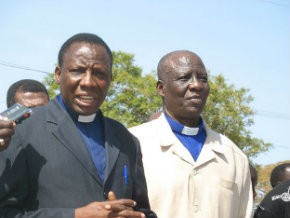The African mainstream

Well-behaved churches seldom make history. Over the past 50 years, fascination with the Christian upsurge in Africa has led many scholars to study new prophetic churches, with a heavy focus on those that draw on traditional African practices. Extraordinarily valuable accounts have been written about African independent churches, such as South Africa’s Shembe movement or the Zion Christian church or the Nigerian-founded Aladura congregations.
While not diminishing the role of such groups, it would be wildly misleading to suggest that African church life is focused on the AIC churches, whose distinctive practices can seem odd or troubling to outsiders. The vast majority of Africa’s half a billion Christians belong to Anglican, Catholic, Methodist, Presbyterian or Assemblies of God churches. Yet it’s not easy to find published accounts on the life of the familiar mainstream denominations. Academics in search of juicy research topics have little interest in examining churches that resemble the ones back home in the U.S. or Europe and that rarely stray into theological extravagance.
Read our latest issue or browse back issues.
I find it amazing that it is so hard to find resources on a thriving and respectable denomination like the Evangelical Church of West Africa. ECWA claims some 5,000 congregations across Nigeria and neighboring lands, with 3 million active members and another 3 million regular attenders. Although founded by Euro-American missionaries, ECWA has for many years been strictly an African church in its leaders and members, and it bows to no external or colonial authority. It is so entirely African and independent as to raise serious questions about the usefulness of the AIC label.
ECWA’s story begins in the 1890s with the Soudan Interior Mission, for which Soudan referred not to the modern nation of that name but to the broad belt stretching across Africa below the Sahara. As the European empires began to break up after World War II, SIM began transferring its operations to the new ECWA church, which officially dates from 1954. By 1976, the new entity had formally inherited all remaining SIM operations, including its educational, medical and publishing activities.
ECWA soon produced a roster of creative and influential leaders. An early general secretary was Byang Kato, whose daring 1975 book Theological Pitfalls in Africa is still widely read. Kato urged the contextualization of the gospel in Africa, but at the same time warned of the syncretistic tendencies he saw among other thinkers of the day. Had he lived longer—he died before he was 40—he would have become one of the continent’s theological leaders.
No less important in his way was Panya Dabo Baba, who headed the church’s Evangelical Missionary Society from 1970 to 1988. However familiar we might find the notion of African missionaries traveling the world today, much of the impetus for that South-North mission came from Baba’s enterprising vision. ECWA now has some 1,200 missionaries active outside Nigeria, spread across Africa, the Middle East, Europe and the United States.
Apart from any individual, ECWA exercises its influence through its two Nigerian seminaries, at Igbaja and Jos. Since 1980, the Jos ECWA Theological Seminary has offered theological training and higher education not just to its own clergy but to a wide range of denominations, including Anglicans. It is a key presence in a nation that currently has some 75 million Christians, a number that could increase to 180 million by 2050.
ECWA lacks many of the features that attract the notice of Western academics. It was not founded by flamboyant messianic prophets, and it has no rituals that bear the traces of shamanic or magical origins. It is a sober evangelical church. Of course, some features separate it from U.S. equivalents, not least in its firm belief in the reality of spiritual healing and exorcism. The church’s claimed success in defeating spiritual evils accounts for a major part of its evangelistic success. But this mission always operates within the framework of church order, avoiding anything that might look like Pentecostal excesses.
ECWA exists in a delicate and often frightening political environment. Some of its greatest centers of strength are in regions that are either Muslim-dominated or equally divided between Muslims and Christians. In the 1990s, ECWA took the lead in protesting the introduction of Shari‘a law in several northern Nigerian states. More recently, ECWA churches have repeatedly been targeted by Islamist terrorists, who just this year adopted the tactic of suicide car bombings against Sunday congregations. ECWA churches and Roman Catholic churches have been the ones targeted, which says something about the significance of the ECWA. It represents, along with the Catholics, the local Christian mainstream.
In fact, ECWA may be the most important church you’ve never heard of.






